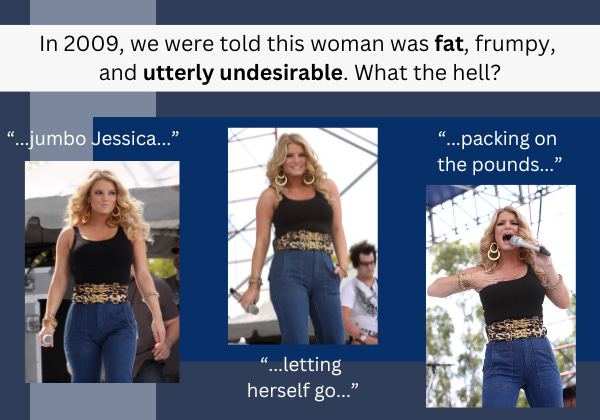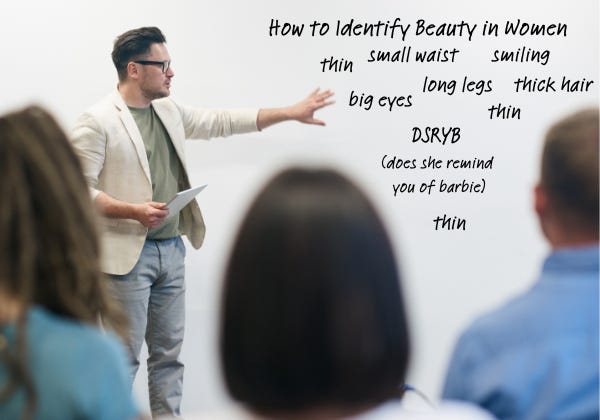A Personal Find/Replace
Generally speaking, I feel pretty confident in my own taste. Not that I think everything I like is good, but I’ve spent a lot of time working out what I like and why. I enjoy the stuff I enjoy and I’m not worried about whether or not someone else thinks a movie I like is “bad.” I can recognize uneven characterization, clichéd plotlines, sloppy editing, and bad special effects. But I can also recognize that I’ll forgive a lot for sharp dialogue, a certain puckish sense of humor, and vibes that remind me of a person or place or period of time that I miss.
My taste in artwork, music, writing, film, food, design, clothing, relationships, and most other things in my life feels authentic to me—to the person I have become over years of living.
Here’s something that doesn’t feel authentic: My idea of personal beauty.
In 2009, singer and actor Jessica Simpson wore a pair of high-waisted jeans and a black tank top during a performance. She looked like a conventionally attractive human woman. Yet to read the contemporary media coverage, you would think she’d undergone a monstrous transformation and could not be gazed upon without evoking horror and disgust so extreme that viewers should fear for their eyes—and stomachs. (Lots of outlets have since scrubbed their deeply misogynistic and fatphobic stories from this era, but the internet is foreverrrrr and the Wayback Machine is great.)
It's ridiculous, right? And yet. At the time I truly believed she looked horrible and fat and how could she bear to have appeared in public like that? The distortions we accept and internalize shape our reality and our perception. Not only of other people but also of ourselves.
So while I feel no hesitation in proclaiming my love of romance novels, cosplay cloaks, Tennyson poems, American cheese, and grammar-nerd mugs, I can barely get myself to acknowledge in my own head that I have an incredibly narrow, rigid, cookie-cutter, patriarchy-derived concept (that doesn’t fit in with any of my other tastes!) of what I should look like if I want to be “beautiful.”
Which is mostly: thin, with big eyes and slim thighs. This is never going to happen for me. Like, it’s physically impossible for me to meet my standards of thinness, not to mention the added impossibility of acquiring (as someone who’s part Asian) the kind of facial features prized for so long in Western cultures.
My first impulse, when I’m trying to work through this unhealthy mindset, is to blame myself. After all, I don’t listen to music I hate just because “everyone else” is. I don’t go to see heavily promoted movies just because the studios want me to. I don’t read books just because Oprah recommended them. Why, then, do I fold to societal pressure and want so badly to be beautiful in a highly specific and unattainable-for-me way? The problem must lie with me for not rejecting that beauty narrative.
When I manage to get some distance from the problem, though, I can recognize that I’ve been programmed more intensely to have that narrow beauty standard than to, say, dismiss the idea of wearing a tweed cloak because it’s unusual.
It’s tough to overcome social and emotional programming. And our culture has programmed women so thoroughly to associate being acceptable (not even getting to beautiful) with being thin. Thinness is, like, the baseline. This programming is done through every kind of media, through parenting, through socializing, through living in the world and seeing how people react to appearances that conform to “conventional beauty.”
Even if you want to push back, until quite recently you’d have been hard-pressed to find any kind of positive representation in visual media of bodies and beauties that aren’t uniform. I’m not saying I can make a difference there. I’m not a visual artist; I’m not a filmmaker. I also feel overwhelmed most days just trying to create a space for my kids that doesn’t involve the crushing pressure of gender expectations (we live in a red town in a red state, which doesn’t help). So what (I ask myself) can I do to improve my own view on this beauty dilemma and, perhaps by doing that, improve the views my kids will adopt (or are adopting)?
Well, I’m trying to reframe my idea of beauty and reprogram myself. What do I find beautiful when I take myself and my expectations out of the picture? Is it a specific body shape? A specific clothing style? What do I find appealing and why? What do I like?
I’ve thought about what draws me to a piece of art or a certain design or just a paint color. What do those things have in common? How does that translate to human beauty? I want to know what appeals to me about bodies and features and faces so I can figure out what my taste is…rather than what some advertising executives decided was “beauty” for all women.
It’s hard not to associate physical beauty with “young, thin, symmetrical,” but when I really think about it, there have been so many times when I’ve seen people who were none of those things and were also beautiful.
That said, I don’t know that I can use my evolving beauty standards for my own body yet? The programming is its most intense when it’s being applied to me, which I think is true for a lot of other people, too. We are better at seeing in other people that “perfection” isn’t the same as beauty.
For example, I was at a hotel pool a few months ago and ended up sitting by the side rather than going in. I was self-conscious about being seen in a swimsuit and, thanks in part to perimenopause, no longer fit into the one I’d bought a few years ago. It wasn’t super comfortable to hunch in a plastic chair, surrounded by uncomfortably humid air, while my friends went for a refreshing swim. In front of me, the water lapped at the pool’s tiled edge, clean and clear and cool—water that I denied myself due to my own fucked-up beauty expectations. Pleasure that I denied myself due to those expectations.
I was about to go back up to the hotel room and feel bad about it in the privacy of my air-conditioned room when a woman about my age walked in, drawing my eye. She was no more than average height, and her body’s curves, dips, and lines matched mine fairly well. She wore a leopard-print swimsuit that flattered her shape but didn’t try to disguise it. She looked great.
From behind my sunglasses, I watched her toss her towel on a chair, slide off her sandals, and walk unhurriedly to the pool’s wide stairs. I thought about my usual poolside strategy: descend into the water with haste, not feeling safe until hidden beneath the water’s surface. She, however, seemed to feel no such urgency—and why should she? She had nothing to want to hide. Her body looked capable, normal…attractive. And if I could see that this woman was all those things, why couldn’t I see the same in myself?
So I’ve been trying to look at every woman I encounter through the lens of finding beauty that pleases my eye instead of pleasing the patriarchy. It turns out my taste in beauty isn’t actually for very slim bodies with little to no diversity. It turns out I can recognize a lot of shapes, lines, and curves as gorgeous. In time, I hope, I can apply that same view to myself instead of just to other women.
It’s a huge, frustrating work in progress to try to look in a mirror and recognize that same beauty in my own shapes, lines, and curves. But seeing it someone else is easier, now, at least. And I think it’s a step toward getting rid of that rigid beauty programming.
I do much of this work alone, in my own thoughts. I still don’t see a lot of media messaging that tells me I’m not old, fat, out of touch—and I want there to be. I guess this is me creating it myself.
It’s painfully difficult some days, but I want to be able to do a find/replace function on my brain. If I find an “I’m not the right size or shape,” I want to replace it with “I’m building a strong body that will support me as I age.”
If I find an “I’m never going to be beautiful enough,” I want to replace it with “I see so much beauty in so many people, including myself—and it’s beauty I enjoy based on my own taste, not that of a male-dominated culture.”
If I find an “I’m out of touch and irrelevant,” it should be replaced with “I have the freedom to decide for myself what I find appealing and fascinating—and I’m open to discovering something new without judgment.”
I’m trying to reprogram and relearn myself, not revile myself. I’m doing it imperfectly and inconsistently but also optimistically.
Yours in a world of uncelebrated but omnipresent beauty,
That Hag
Two Ways of Seeing Beauty in the Week Ahead:
1. You probably have something you find beautiful in your home, so take a few minutes to analyze why you find it so. Is it the colors—if so, how do they make you feel? Is it the shape? The detail and level skill needed to create this object? How does this thing in your home tie into the way you perceive beauty in human beings?
2. Look at something beautiful that’s ephemeral and something beautiful that’s enduring. Even if it’s just as simple as a flower before it wilts and a stretch of land that will endure for generations. Or a lovingly crafted pie and a purposefully crafted cast-iron pan. There are different elements of beauty in these things. What elements of these different types of objects contributes to their longevity? Are the things that make a flower beautiful also the things that shorten its lifespan?




Yes to all of this. I can't believe how critical I am of my body and of OTHER women's bodies. I mean, who the hell am I to judge? The programming is so deeply enmeshed into my brain that removing it will probably take a reset (which isn't possible). I am so tired of it. And it makes me so sad to see Jessica Simpson now so terribly thin that people are concerned for her health - and I'm sure it's because of all the grief she received over the years from the media and others. As a woman, we just can't win.
I've found that following body positive women on Instagram has helped - I try to follow women that look like me and to see how yes, I can be happy and wear cute clothes with my body style.